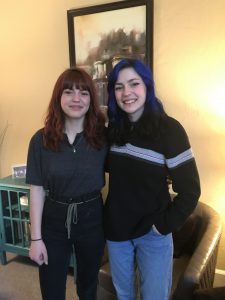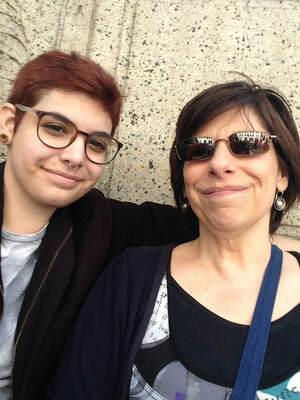Teen Connectivity Podcast
These 71 episodes were recorded between October 2018 and March 2020.
1 - An Honest Conversation About Screens
Today’s episode will explore the issue of parenting in the digital age and how to get out of the cycle of using screen time as reward and punishment. Not all screen time is equal. We will look at the good and the bad and how we can best balance being a consumer with being a creator. Parents will be asked to reflect on their own screen habits before looking at a framework for house rules regarding technology. The goal is to humanize ourselves with our children, avoid power struggles and deepen our connection to one another as all of us learn how to co-exist with technology in the healthiest way.
2 - The View from a High School Counselor’s Desk
In this episode I speak with high school counselor, Laura Mundy. Not only do we discuss the greatest challenges facing today’s teens, we shine light on where she finds the greatest hope for the future.
Resources:
The Conscious Parent – Dr. Shefali Tsbary
Sources of Strength
Jean Twenge Atlantic Monthly Article
If you or someone you know is in need of help, call the National Suicide Prevention Lifeline:
988
3 - Modeling Connection in a Disconnected World
In today’s episode I explore connecting ourselves to our infinite potential for growth and change and cultivating this belief that this is also true for others. Our children are learning by watching how we react to ourselves and to others in all situations. We are modeling something very powerful when we allow our children to observe us learning our way through our own difficult situations.
4 - Amelia’s Perspective – A Conversation With a High School Senior
In today’s episode I will interview a remarkable young woman in her senior year of high school. We will talk about social media, college, the pressures she faces, what she wishes adults understood and her excitement about voting and making the world a better place.
5 - Be the Person You Needed When You Were Younger
In this episode I will examine the idea of being the person you needed when you were younger. Not only does this mean being empathetic in our approach as our children make inevitable mistakes, it also means modeling and offering thoughtful, intentional resiliency training. This will equip our children for lifelong mental wellness.
6 - Building an Emotional Bank Account
In today’s episode we explore the idea of how to build an Emotional Bank Account. Consistent deposits that maintain a healthy balance will strengthen the relationship, deepen connection and allow for withdrawals taken when we slip into reactive parenting.
7 - Gratitude Mantras, Soul Collage and Life Pie: An Interview with Jenise English
Gratitude Mantras, Soul Collage and Life Pie: An Interview with Jenise English
8 - What is Your End Game?
We have to do more to prepare to get a driver’s license than we do to become a parent. Wouldn’t it be great if there were high school and college classes that helped us all reflect on what it means to raise a human being for 18 years? In today’s episode we will look at what tools and values you would like for your child to have when she reaches the age of 18. Once you have clarity on your end game you will have a litmus test for the boundaries you set and a well thought out reason for all your yes’s and no’s.
9 - The Halls of Junior High – An Interview with Carmen and Azlyn
Today’s episode is a conversation with two lovely 9th grade girls. We get a small snapshot of their world as we discuss school, parents, social media, fears and hopes.
10 - When To Seek Therapy for Your Child – An Interview with Dr. Mariella Hogan
Today’s episode is an interesting discussion with Dr. Mariella Hogan, a psychologist and art therapist. We discuss different types of therapy available for your tween and teen and when to seek a mental health check-up. She encourages kids to do their own research about what interests them and how their choices effect their brain so they can make informed choice.
11 - Gaming – The Good and the Bad
Collegiate e-gamer, Oscar Filson, talks about the benefits and drawbacks of spending time playing games on a screen. He is a remarkable young man who, through gaming, has built friendships and community, learned about computers and figured out some strategies for managing his time in both his real world and his on-line world. He has some words of advice for young gamers and parents as he offers us a glimpse into his unique world – one that didn’t exist just a short time ago.
12 - Ways I Hope To Be a Better Role Model in the New Year
As we close one year and prepare to ring in the new, I take some time to reflect on changes, growth and authenticity. I explore ways I hope to be a better role model for my children and my intention to do my best to be fully present for the people in my life. What are your new year’s intentions?
13 - An Open New Year’s Letter To My Daughters
Today’s episode is an open letter of random musings to the beautiful beings that I get the gift of calling my daughters. Cheers to a new year filled with time with those you love and year of deepening your family connection. By creating strong, healthy families, we heal the world.
14 - Twin Teen Tales Part 1
This is part one an inspiring conversation with Sophie and Livvy – high school seniors who happen to be twins. Their wisdom, creativity, awareness and knowledge about human nature seems way beyond their 18 years. They are fueled by the love and strength they find in each other, their family and the ways they strive to intentionally deepen connection in their community. Their views on technology and the ways they work to maintain mental wellness also surprised me. In short…they are remarkable beings.
15 - Twin Teen Tales Part 2
This is part two an inspiring conversation with Sophie and Livvy – high school seniors who happen to be twins. Their wisdom, creativity, awareness and knowledge about human nature seems way beyond their 18 years. They are fueled by the love and strength they find in each other, their family and the ways they strive to intentionally deepen connection in their community. Their views on technology and the ways they work to maintain mental wellness also surprised me. In short…they are remarkable beings.
Sophie and Livvy
True Teammates-Livvy fixes Sophie’s hair before our photo shoot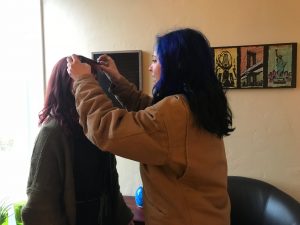
Sophie’s Art


Livvy’s Art


16 - The Space Between Fear, Anger and Sadness
When the rubber hits the road during the teen years, challenges can sometimes find us stuck in the unhelpful emotions of fear, anger and sadness. This episode explores ways to move through these emotion to a place of productive love and action, which paradoxically can sometimes mean sitting still, accepting the as-is of the situation and allowing your child to navigate.
Questions for Reflection:
-Where is my child in his or her brain development and are my expectations out of alignment of where my child is developmentally?
-Have I taken the time to intentionally define the ways I want to show up for my child? Sometimes showing up means not controlling and simply walking beside. Being pure presence and not distracted by my life and the world.
-This can be great question for your child when behaviors manifest. It needs to be said with neutrality. A simple inquiry to get them thinking. Are you showing up for yourself and in this world in the ways you want to? Simply being a mirror. Give them agency for their choices. In other words, helping them see that they have all the power to make a new choice.
-What coping skill might I or my child lack?
-What self-care skill might I or my child lack?
-What needs aren’t being met that might be leading to self-defeating behavior?
-Am I rushing in with misplaced energy and perhaps over reacting?
-Are my emotions drowning my perception?
-Can I acknowledge and be gentle with myself knowing that I did my best to teach and model for my child in this area?
-Is perfectionism and comparison causing self-defeating behavior in my child or myself?
-Can I acknowledge and be gentle with myself and be authentically human with my child in discussing where I may have come up short in this area as a parent? So much learning and repair can come from this act alone. We can’t and won’t get it right all the time. Our kids learn so much in our honesty about not always being or doing right. Can I admit my mistakes? This will allow them to be gentle on themselves and work to quell perfectionism. We are their model for flexibility, acceptance and self-forgiveness.
-What might be going on under the surface for myself and for my child? Are there other stressors at work or school or in other relationships that are contributing to the behaviors or my reactions?
-What controls might I have placed too tightly on my child that they are rebelling against? Can I admit this and course correct?
-Have I historically solved too many problems for my child and how do I course correct?
-What is simply my child’s wiring and part of their destiny and necessary learning? In other words…there are lessons we all have to learn for ourselves.
-What is truly in my control? Where I can make efforts to course correct and what do I need to let go of?
-Have I done the internal work I need to do that makes me strong enough to allow me to simply be an observer to some of my child’s necessary failures? Can I be quiet when I should be and just love and allow her journey to unfold? It is her journey, not mine.
17 - Journey of a Young Adult: From High School to Peru to Endless Possibility
In this episode I interview a young adult, Trey, who has chosen to take a gap year and continue his education and process of self-discovery in his own way. Trey shares his views on education, social media, connection and reasons for wanting to live in a tiny house. Trey gives us some insight into what it is like to be a young adult in the beginning stages of designing an independent life.
18 - Teen Sleep Matters
In today’s episode, I interview Dr. Sara Morrow – a child psychologist on a mission to change school start times. She has compiled 20 years of research that proves that later school start times for teens lead to: healthier sleep hygiene, less depression, less risky behavior, better performance in school, better and safer performance in athletics, safer driving as teens get themselves to school, better moods, fewer morning parent/teen power struggles and surprisingly, positive economic implications.
Resources:
American Psychological Association Policy Statement with References
The Economic Implications of Later School Start Times in the United States
Later Start Time for Teens Improves Grades, Mood, and Safety
Relationships Between Hours of Sleep and Health-risk Behaviors in US Adolescent Students
Start School Later
“Changing Bell Times to Meet Student Needs: A Toolkit for Superintendents and School System Leaders” (They sell a pdf guide for $99)
Nonprofit agency directed by professionals from education, child development, mental health, pediatrics,dedicated to helping school districts make the transition to later start times for middle and high school.
19 - Smart Phone, Landline, Flip(in’) Phone
In this episode we meet a high school senior who did not want to replace her smart phone when it broke. She had recently learned that the cobalt used to build lithium-ion batteries comes from the Congo where adults and children mine it under very dangerous conditions. Her dad wasn’t too keen on the idea of no phone because, let’s face it, smart phones have made keeping track of and communicating with our teens much more convenient. We get a glimpse into her world, how she feels with less phone communication and the ways she is taking charge of her own life as she prepares to leave for college.
20 - Her Daughter is Now Her Son
This is one mom’s story of her transgender daughter transitioning into becoming her son. It is a beautiful tale of one family’s amazing unconditional love, acceptance and support for one another’s individual, unique journey. This is a story of loving our kids for who they actually are, not for who think they are or the vision we might hold for them. This is an example of parenting through a lens of seeking to understand first.
21 - The Man I Was Meant To Be – The Journey of a Transgender Teen
In today’s episode, we meet Prin, the transgender son of Lori from episode #20. We will hear his perspective on what it was like to be a transgender teen, his thoughts on how his family supported him through his transition and his advice for parents and kids who might be at the beginning a similar journey.
Resources:
Transgender Law Center
Mission: Transgender Law Center changes law, policy, and attitudes so that all people can live safely, authentically, and free from discrimination regardless of their gender identity or expression.
Trans Day of Remembrance
Transgender Day of Remembrance (TDOR) is an annual observance on November 20 that honors the memory of those whose lives were lost in acts of anti-transgender violence.
A Guide to Gender: The Social Justice Advocate’s Handbook by Sam Killerman
Prin and Lori – Name Change Day!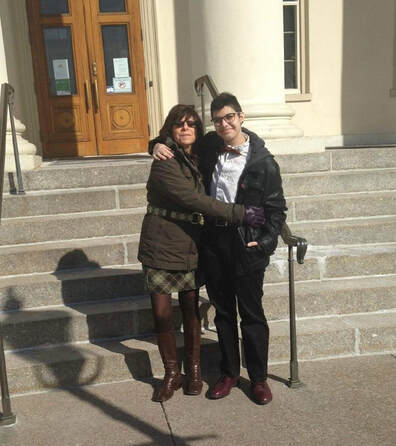
22 - Cultivating Resilient and Capable Brains
Today’s episode is based on the research of Dr. Dan Siegel and Dr. Tina Payne Bryson. Having an emotional outburst, whether you are a toddler, a teenager or an adult, can take us by surprise and feel scary. Our brains become dysregulated and trying to teach a lesson about behavior in a moment of emotional chaos does not work. Dr. Siegel says that we all have a “window of tolerance” – that sweet spot where we are flexible, adaptable and able to handle setbacks. Outbursts, or the other extreme of shutting down, happen when we are outside of our “window of tolerance.” Today we explore strategies for being soothing and compassionate during times of emotional chaos in order to bring your child back into her “window of tolerance.” Once her brain is settled, behaviors can be addressed. You can then teach skills for allowing and moving through feelings WITH appropriate behavior. As parents, we have the opportunity to help our child widen their “window of tolerance” as they move towards the ability to become their own expert self-regulator. It all starts with us, as parents, understanding how the brain works and keeping our cool.
Resources:
The Yes Brain
The Healthy Mind Platter
23 - Youth Mental Health First Aid
Shannon Decker is Executive Director of The Speedy Foundation. The foundation was formed after Jeret “Speedy” Peterson died by suicide in July of 2011. Jeret was an American World Cup aerial skier and silver medalist at the 2010 Winter Olympics in Vancouver. The Speedy Foundation’s mission is to prevent suicide, promote conversations to end stigma, and support mental health education. Shannon talks about the warning signs of suicide and what to do if someone you love is having thoughts of self-harm. She discusses some of her interactions with teens effected by suicide, hopeful programs that she is seeing across the country and her work as a Mental Health First Aid Trainer.
Resources:
988 (Suicide Prevention Lifeline)
The Speedy Foundation
Youth Mental Health First Aid Courses
My3 Suicide Prevention App
Signs of Suicide (SOS) Prevention Program
Jason Flatt Act – Idaho – Empowering Schools in Suicide Prevention
ACE’s (Adverse Childhood Experiences Study)
The Big Little Book of Resilience by Matthew Johnstone
24 - Alternate Routes – The Circus Saved Me
Meet Grace. This is part of her incredible story of transforming and healing herself after dropping out of high school, navigating trauma and major family changes, using lots of drugs and frequent self-harm. She isn’t quite 19 years old but through overcoming incredible challenges is wiser and more self-aware than many adults. She has paved a non-traditional path for herself and has reached a place of knowing who she is, what she wants to do and is helping others along the way. She is an incredible example of the power that is within all of us and a reminder that there are many paths to creating a fulfilling, whole and healthy life.
Resources:
Life’s Kitchen
Ophidia Studio
Amazing Grace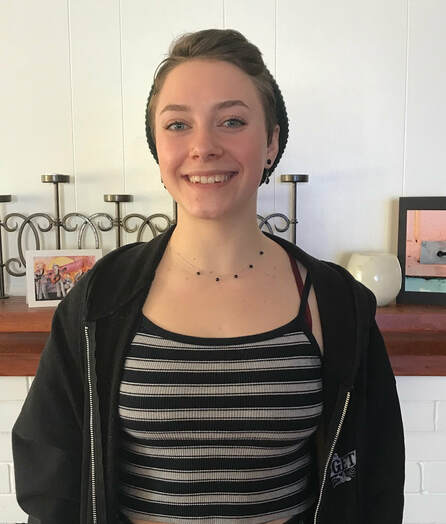
“This idea was started when I was getting clean. Although I never finished it, it holds a lot of emotion, and ultimately began my journey of using art as a way of coping.”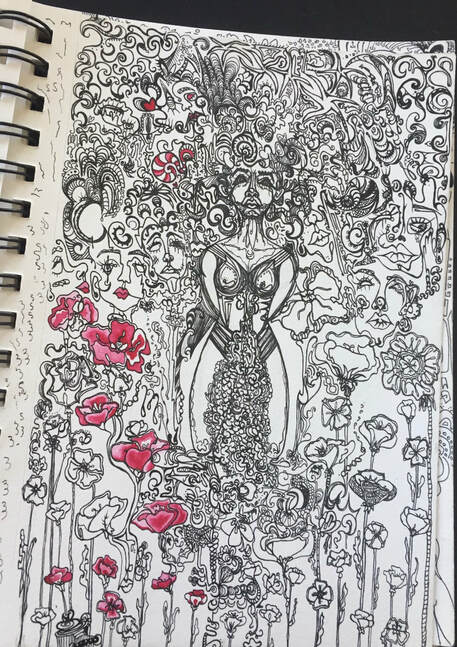

25 - Turning a Blow-Up Into a Growth Opportunity
A blow-up or major conflict is actually an amazing opportunity to practice skills and grow emotional capacity. This is how we as parents and kids both get to widen, as Dan Siegel would say, our “Window of Tolerance.” Times of high tension can lead us to greater self-mastery and the ability to navigate discomfort and anger. It is during these times we learn to communicate in more effective ways. These emotionally charged moments that seemed filled with despair can actually serve to deepen connection and grow the parent/child relationship. It’s time to embrace and be grateful for these sorts of practice opportunities that will continue to show up for us. How we show up in these moments makes all the difference.
26 - My Wise, Strong, Beautiful Girl
Like many of today’s teens, my daughter has struggled with major depression and anxiety. She has survived and is learning to thrive in spite of my lack of parenting skill. She has been gracious and patient with me as I have learned to be a better mom. She has figured out how to cultivate her inner world and tap into her own power as she begins her journey as an independent young woman. She is my greatest teacher. Her wisdom, wit, strength and empathy are a source of inspiration. The world is ready for this young woman’s unique and loving contributions and I am so grateful to be on this journey with her.
27 - Teen Toolkits For Life
Today’s interview is with a dynamic group of women from Sacramento who started an organization called Cour Training – Toolkits for Life. They noticed an increase in anxiety with their children and children in their community and decided to take action. They host weekend workshops for teens and parents equipping them with simple tools for reducing anxiety, regulating emotions, building resilience and providing an opportunity for connection and community.
28 - Helping Our Kids Learn To Learn
“Education in the 21st century must adapt to the challenges students face in today’s world. Scientific research on cognitive development has revealed exciting discoveries about the way adolescent brains function and ways to teach the way the brain learns best.” says Casie Buckner-Munteanu, B.A., M. ED. In today’s interview she provides resources and tangible strategies that you can use with your teens to help them discover their learning style. Teaching our kids to understand and advocate for how they learn best is one of the greatest tools we can give them. This is how we begin to cultivate a desire for lifelong learning for learning’s sake.
Resources:
The Learning Process In 3 Steps:
(How do you learn best?)
1) How do I get information into my brain?
2) What do I do with it once it’s there?
3) How do I get it back out?
Recommended Books:
Study Power: Study Skills to Improve your Learning and your Grades
Luckie, William R. and Smethurst, Wood. (1998). Study Power: Study Skills to Improve your Learning and your Grades. Brookline, MA: Brookline Books.
Spark
Ratey, John J. (2008). SPARK: The Revolutionary New Science of Exercise and the Brain. New York, NY: Little, Brown & Company.
Teaching With The Brain In Mind
Jensen, E. (1998). Teaching with the brain in mind. Alexandria, VA: Association for Supervision and Curriculum Development.
How The Brain Learns
Sousa, D. A. (2006). How the brain learns. Thousand Oaks, Calif: Corwin Press.
The Science Behind Learning
The Impact of Enhancing Students’ Social and Emotional Learning
The Brain Basis for Integrated Social, Emotional, and Academic Development
The Evidence Base for How We Learn
National Commission on Social, Emotional and Academic Development
Art Integration:
Art & English
Using primary colors, students created an introduction and a conclusion. The topic sentence needs to repeat and it is restated in the conclusion as represented by the colors. The teacher chose primary colors because they are clear, concise and basic. The body of the paragraph, which would include greater details and larger explanations of the topic, were represented by secondary colors.
Art & Math
Ratio, Color, Pythagorean Theorem
Using a 4:1 ratio students enlarged a spherical object and incorporated an overlapping right triangle in the layout. They then developed a color scheme differentiating the triangle from the sphere. Finally, students solved for the hypotenuse using the Pythagorean theorem. Rough draft required. Chuck Close and Frank Stella work used as master references. Prismacolored pencil on paper.
Art & Science
Transformation Drawings
Students were to transform a drawing of a strand of DNA to a drawing of a living thing in four phases. Landscape or portrait format. Rough draft required. Design elements utilized were line, shape, color and balance. Henry Moore and Edgar Degas drawings as master references. Graphite on paper.
29 - Commitments, Chaos and Modeling
This week’s short episode is a quick reminder of how we can model controlling our thoughts, reframing our perspective and keeping our commitments in the midst of chaos. In other words, modeling resilience.
30 - The Healthy Mind Platter
The USDA has upgraded the food pyramid to “choose my plate” as a way of helping us optimally fuel our bodies. Dr. Dan Siegel and David Rock have created a similar idea as a way of designing our days for optimal brain health. It is called the Healthy Mind Platter. In today’s episode we will look at the seven activities each of us should include every day to create conditions for brain health, connection and overall wellness. This is a great tool for cultivating awareness and the helping our kids and ourselves to better self-regulate in the digital age.
31 - Keeping Perspective When Your Child Is Upset
When we react with strong emotions each time our child is upset by a setback or challenge, we add our unnecessary anxiety to an already emotionally charged situation. A situation that might resolve or dissolve in the next moment if it isn’t fueled by attention and energy. This is something to be especially aware of in today’s parent/child relationship where we have access to one another all day long via text. This episode invites you to intentionally choose when and where to direct your energy. In doing so, we model a balanced approach to dealing with discomfort. We are teaching that every uncomfortable feeling, mistake or challenge is not an emergency. This is how we create conditions for resilient, flexible and balanced kids.
32 - Reclaiming Joy: Mother’s Day Reflections
What do you want to grow in your relationship with your child? This episode will challenge you to turn an exhausting moment or a parenting challenge on it’s head as you focus on the growth that is happening. By focusing on the growth, you will gain a deeper understanding of yourself, your child and the human experience. By intentionally choosing where to place your focus you can tap into deeper joy rather than tapping out with exhaustion.
33 - Learning To Model Body Acceptance
oday’s conversation is with a dynamo woman – Kelly Lynae. She is an amazing human, singer/songwriter, and creative marketing professional. AND… she is just now learning to love and accept her body. She answers the question “What is my body for?” with ” I want my body to be a tool for my passions and for my story to play out.” She is done trying to make her body look a certain way for others. The sooner we can do our own work of self-acceptance and answering the question “What is my body for?” the sooner we can authentically model this for our kids and break generations of dysfunctional thinking surrounding our appearance never being good enough. We can model joy and living life to the fullest now, not waiting to look a certain way. Don’t we want this for all of our kids? It starts with how we view ourselves. You are enough just the way you are.
34 - You Might Not Be Doing Things For The Reasons You Think
Can outside forces influence our behaviors without us even being aware? Is their something to the power of suggestion? Do first impressions really matter? In this episode we explore the concept of psychological priming. Once we have an awareness that our brains are susceptible to outside influences that can shape our future behaviors, we can be more intentional with our mental diet. We can unpack our behaviors by examining seeds that might have been planted in the moments or hours prior. We can cultivate this kind of awareness in our children as they learn to regulate what they consume digitally and together, we can all work to prime for good. How can we set an intention to approach each encounter with another human in a way that starts a positive chain reaction?
35 - Teens and Alcohol – Part 1
This episode is part 1 of a 3 part series on scientifically proven methods parents can use to reduce risky alcohol use. Does allowing teens a small glass of wine at Thanksgiving take away the allure of alcohol as a “forbidden fruit”? Does the approach of allowing teens limited access to alcohol reduce the frequency and amount kids drink later and open the doors to honest communication between parents and kids about teen alcohol use? The short answer is a resounding “no.” Penn State Professor, Dr. Rob Turrisi, has dedicated his life to researching parent-based interactions to prevent underage drinking. In this episode we learn how he started this work and his surprising findings that have been replicated in numerous studies across the world. The way parents approach the the topic of alcohol use is scientifically proven to reduce risky behavior.
36 - Teens and Alcohol – Part 2
This is part 2 of a 3 part series on teens and alcohol based on the research of Penn State Professor, Dr. Rob Turrisi. In this episode we do a deep dive into 3 of the 5 things Dr. Turrisi recommends parents do. 1) Communicating about alcohol use in true dialogue (not monologue/lecture). Practice living in their world as you communicate and back up your point of view with health science. 2) Modeling with explanation. 3) Monitoring in creative ways that not only allow insights into your child’s activities and friend group but model parenting that will shape parenting for generations to come.
37 - Teens and Alcohol – Part 3
In the third and final part of this series, Dr. Turrisi will walk us through how to communicate parental rules around alcohol that are backed by science. This is a more effective way of educating and getting buy-in than the teen thinking that our rules are coming solely from our personal value system. He says that “a rule without an explanation is likely to be broken” but a “rule with an explanation is likely to lead to learning.” Dr. Turrisi will also walk us through his fifth and final strategy of setting-up a home environment conducive to effective communication, modeling, monitoring and parental rules. All of this with the goal of protecting our kids from risky behavior. It is never too late. A little change and a little science-based upgrade in our parenting skills can have a big impact in reducing risk.
Resources:
When It Comes To Curbing Drinking, College Students Do Listen – Time Magazine with Dr. Turrisi
Talking About Alcohol – A Parent Handbook
Parental Strategies For Reducing Risky Behavior Around Alcohol
1) Communication
Make sure it is two way.
Live in their world, don’t just ask them to live in yours.
Ask questions that begin with “what,” “how,” and “why.”
2) Modeling
Make sure and explain why you are doing what you do especially with alcohol and transportation. Left to their own interpretation, teens might connect the dots in a much different way than you intended. For example, you hand your teen the keys to drive you home after a couple of drinks. You think you are modeling that you don’t drink and drive. The teen might interpret this as you drink to the point you can’t drive. You can control the story by sharing your “why.”
3) Monitoring
Be creative in the ways you check-in with your kids, their friends and other parents. You are also teaching good parenting and remember…”when you parent, you are parenting your grandchildren.”
4) Parental Rules
Rules backed by health science, not just coming from our personal value system. Teens might still use alcohol but Dr. Turrisi’s research shows that setting the rule and communicating your why, reduces risk, frequency and amount consumed.
5) Environment
Setting-up an environment in your home that is welcoming to other kids, accepting of differences, conducive to communication, connection, modeling and monitoring. If we are lucky will lead to some acceptance and buy-in of parental rules.
38 - The School of Opportunity
In the digital age, we are in a state of constant engagement with information. The news that is reported and repeated is often bad and scary. Many kids are not optimistic about their future. What can parents do to cultivate a type of hope that leads to action? How do we introduce our children to the voices and stories that aren’t being told in the news? Chuck Hagele, director of Project Patch, talks about a program he created with this very mission. It is called The School of Opportunity. Chuck finds people who are engaging in a hard world in a proactive way and are willing to share their stories with teens. His advice to parents is to find that spark – the small things that are fueling our kids and then connect them with success stories that will inspire them to chase opportunity. There are small miracles and unsung heroes everywhere.
39 - Creating A World Of Kind, Connected Human Beings
Becky Carson-Eisenman takes us through twelve inner tools that we can teach our kids and ourselves to use to navigate life’s ups and downs. Strengthening these abundant inner resources promotes a healthy relationship with self and with others. These tools help build self-mastery and resilience and cultivate empathy. By using this common language in our homes we can foster deeper connection and wellness within our families and communities.
40 - The Influence Pyramid – Helping Things Go Right
Today’s episode comes from a concept from The Arbinger Institute – The Influence Pyramid. This tool has many applications for parents. It is a new way of thinking about communicating and connecting. It is an approach for helping things go right, rather than just dealing with things that go wrong. Using this approach is healthy modeling for our kids. Intentionally working with this technique and teaching it to our children has the potential to not only strengthen the parent/child relationship, but to strengthen all of our relationships.
41 - How To Help Kids Who Are Scared About The Future
Many of our kids are scared about the future. They are bombarded with constant negative news including lots of frightening predictions about climate change. Many don’t think the adults are doing enough to turn the tide. How do we validate their feelings while modeling calm and holding a bigger perspective? How do we model hope in action and connect them with the inspiring innovators? What is within each of our “circle of influence” and what small actions can we take in spite of feeling overwhelmed? Above all, how do we keep these sensitive kids from being swallowed by big feelings and fears and turn their awareness and sensitivity into a super power – a catalyst for creating change? There is work to be done but there is still beauty, mystery and joy all around us.
42 - Helping Your Child Find Their “Star Power”
What is “star power” and how can we help our child find and celebrate theirs? Today’s guest is Toni Ramey, Executive Director of Girls On The Run Treasure Valley. This unique program uses the modality of running to help girls connect with themselves and with others. GOTR goes well beyond the physical and mental benefits of physical activity and helps girls cultivate self-awareness, select healthy relationships and identify, celebrate and use the unique gifts they each bring to the world.
43 - 8 Steps To A Gentle Response
When formulating a response to a situation, these eight questions by author L.R. Knost, can guide you to a place of compassion, empathy and clearer intention in your parenting. This approach will ultimately guide your child to solve his or her own problem or identify what led them to success and lead to growth for both parent and child. Responding with gentleness does not mean that we don’t have boundaries. Quite the opposite. We become clearer about the “why” behind our boundaries and therefore, able to hold them with more consistency and greater love.
Resources:
L.R. Knost Little Hearts/Gentle Parenting Resources
8 Steps To A Gentle Response (L.R. Knost)
-What need is my child communicating?
-Is my response helpful?
-Is my response kind?
-Is my response about my child or myself?
-Is the environment appropriate for my child?
-Are my expectations reasonable?
-Are my expectations clear?
-How would I want someone to respond to me in this situation?
A song that I love that captures the sentiment of this episode
44 - Somedays I Want To Quit Parenting
There are days we all feel like giving up. You might feel caught in power struggles and conflict. Somedays you feel like you are the only one not getting it right. Everyone else’s family appears to be operating more smoothly than your’s. You are exhausted. This. Is. Hard. You aren’t alone. All long term commitments cycle through phases of peaks, valleys and plateaus. Unless we are willing to post our rough days on social media, we need to stop posting our “perfect” moments. Let’s be authentic and gentle with ourselves when it is our turn to walk through a valley. Let’s be gentle and authentic with others when they are in their low places too. We all get our turn with the good and the bad. Rinse and repeat. Failures and setbacks = growth. Just keep showing up and loving.
45 - 10 Back To School Parenting Tips
The rhythm of our days is about to change with back to school. Here are 10 parenting tips to help you settle into the new routine and set everyone up for success.
46 - Being Human – One Teen’s Perspective On The Digital World
Today we meet Amelia, a dynamic high school sophomore who is blazing her own trail growing up in the digital age. After reading the book “Being Human In A Digital World” she decided she wanted to teach other kids at her school about what she was learning, particularly the concept of the Digital Billboard. A person’s Digital Billboard is everything you can find out about a person online. This online portfolio is not just personal posts. Posts by others who we are digitally connected to, but might not really know, become a part of our Digital Billboard. She started her journey by wanting to help teens really think about how what they share online can effect their future. Then her journey became more personal. She decided to change her relationship with her phone and especially with social media. She is in month 7 of a social media fast and her awareness about her world is changing. She is braver about making face to face connections and meeting new people in the real world. She also feels safer because she is more aware of her surroundings by not having her face buried in her phone. She doesn’t want technology to go away as she sees many upsides. She wants to model breaking the addictive cycle of social media use, using technology as a positive tool and creating more face to face connection.
47 - Parent Shame and Guilt
We are hardest on ourselves. This is true of our children and this is true of us as parents. We are often caught in cycles of confusion for fear of making the “wrong” decision. We overthink many decisions without taking a step back to look at the big picture. We don’t take the time to connect these decisions to our end goal in raising kids. We easily beat ourselves up when things go wrong and we sometimes carry more of the burden than we should. Today’s episode explores strategies for moving from the toxic and unproductive space of fear, confusion, guilt and shame to parenting from a space of clarity, calm and compassion for self.
48 - Parenting For A Strong Mind
In today's interview, clinical psychologist Dr. Roger Olson talks about three different characters that each of us can develop that will help strengthen minds and build connection and resilience. Each character represents a set of skills that children can learn from their parents. The Captain refers to executive functioning skill. In other words, one's "capacity to meet challenges and accomplish goals." The Lookout refers to mindfulness, awareness and perspective taking. The Storyteller is all about making sense of our life story, reframing obstacles as opportunities and shaping our inner dialogue to be language that has the potential to serve our highest self. All of this, of course, begins with parental modeling of these character traits and skills.
49 - Thriving In The Doldrums
If we are honest, many of our days could be viewed unexciting and uninspiring. Much of life is performing what we perceive as mundane, everyday tasks and obligations. Then we sleep (not enough), wake up and repeat. However, we live in culture that has trained us to strive for accomplishment in each moment and experiences that are bigger and better than the last. Many of us are in a state of constant competition to keep up with how great we think everyone else’s life is. Average is not good enough any more. We are all being programmed to seek Instagram worthy moments all day every day. Our expectations are high. No wonder our kids are struggling with anxiety. Perhaps we can all begin to play a part in healing our social fabric by learning to find the extraordinary in the ordinary and modeling this for our children. There is a way to find miracles and beauty, even in the doldrums.
50 - Soulful Insights From Seven Year Of Mentoring Teen Girls
Lisa Luna Stravers has a unique approach to mentoring teen girls. Today she shares soulful insights into the life of this generation of teen girls. Their reality is not what you might think. She was gifted this knowledge as she lead a teen girls’ circle that maintained the same core group for 7 years. She journeyed with these beautiful young humans as they discovered their sexuality, navigated relationships, lived with crushing academic pressure, experimented with too many substances, dealt with self-harm, suicide attempts, parent deaths and divorces. The girls felt a safe respite in her care and for the first time felt deeply listened to by an adult. Her guidance saw them through some of their toughest times. There are bits of wisdom she shares that are applicable to anyone raising a daughter today.
Resources:
Contact Lisa
Earth Song Healing Arts
51 - Investing For Your Teen’s Mental Wellness
In a 2017 survey, 35% of teens say they struggle with feelings of hopelessness or depression, more than 21% have had suicidal thoughts, 18% have made a plan to end their life and 9% have attempted suicide. It is time to start new conversations and new ways of meeting our teens’ needs. It is time to invest upstream – to invest in prevention, resilience and mental wellness rather than waiting to invest when a crisis hits. This episode explores ways we can invest our money, time and energy in ourselves and our teens that has the potential to prevent crisis, promote wellness, cultivate resilience and deepen connection.
Resources:
2019 Idaho Youth Risk Behavior Survey
52 - When in Fear, Anger or Confusion, Make Deposits
There is a new book that is so relevant – Parenting the New Teen in the Age of Anxiety by Dr. John Duffy. This podcast shares a mission with this book – to deepen our understanding of what it is like to be a teen in the digital age. Today’s episode examines the first part of this important book and looks at strategies to help parents understand the new adolescent and to move through fear, anger and confusion to connection and consistent deposits in the Emotional Bank Account.
53- Self-Perception, Facing Challenges and a Song by Vashti
Today’s episode explores the ways our self-perception can expand and contract many times throughout the day. Our self-perception affects the ways we interact with others as well as how we either face or avoid difficult emotions and situations. How does your teen perceive herself? How does she face or avoid feelings and situations? How do we help foster a positive and expanded self-perception and feelings competence and resilience in our children? Some strategies explored include learning to question all of our thoughts, learning to treat yourself like a cherished friend, building a resume of small successes that lead to competence and confidence, and welcoming challenges as opportunities for growth. Vashti also shares a song she wrote about this concept called “Walk Into The Wind.”
54 - Quick Tips For Bringing Your Best Self Online
I often get asked “What age is it appropriate to give my child a phone or computer?” Diana Graber, author of Raising Humans in a Digital World, gives a list of 7 questions to gauge readiness. Even if your child is older and already has a device, these are still useful questions to spark conversations as you continue cultivating awareness and educating. Mastering living with technology in healthy ways is a process just like them learning to drive. This episode explores ways adults and kids can continue to work to bring their best selves to the digital world.
55 - Co-Regulating Emotions Is Your Parenting Superpower
Co-regulation is keeping your calm when your child can’t. It is acting as their upstairs brain when they are in fight or flight states of hyper-reactivity or withdrawn. It is modeling self-regulation in the face of stress and using co-regulation to teach self-regulation. Understanding and using this concept is incredibly effective for connecting with your child while teaching them. Working through these skills with intention and the right mix of love and firmness will lead to launching an independent, capable and resilient adult – an adult who can keep their cool under pressure, maintain a greater perspective and walk through the world with more gentleness.
56 - Emotional Equations: Anxiety = Uncertainty x Powerlessness
Today’s episode explores the concept of Emotional Equations by author Chip Conley. This concept provides a new way of breaking down your emotions and getting to the heart of what is actually going on. From this place of clarity, you can take charge of what is within your control and let go of the rest. For example, Conley’s emotional equation for anxiety is anxiety = uncertainty x powerlessness. He has a wonderful process for reducing anxiety and increasing your power by listing what you know, what you don’t know, what is within your control and what is out of your control. In this age of anxiety, parents can model this process and intentionally teach and practice it with kids, leading families to greater wellness. This is a powerful new tool for your parenting toolkit.
57 - Marvel at the Miracle: Insights from Dr. John Duffy
When was the last time you took a moment to marvel at your child’s very presence, uniqueness and beauty, like you did when they were babies? When you look at your 14, 17 or 19 year old in this way you can cultivate a resurgence of new energy, love and affection that might be lost under layers of anxiety about them. Trying this strategy during phases that aren’t your favorite will remind you that your adolescent is still one of your favorite people and a miracle. This can be the beginnings of repairing and deepening connection. Dr. John Duffy, author of “Parenting the New Teen in the Age of Anxiety,” articulates the reality of today’s teen and offers parenting strategies that not only help build one of the most important relationships in your life, but also help add a protective layer as your children navigate a complex world.
58 - The Chore Battle Rages On
The struggle is real and there is not a solution that is as simple as “10 Ways to get Your Kids to Help Around the House.” Our lives are busy. Careers, household management and all of the invisible mental and emotional work that parenting requires leaves us exhausted most of the time. Our kids have no way of understanding this load. However, as parents, we often we don’t take into account the invisible and emotional work of growing up. If we can step outside of our exhaustion and frustration and view the chores as a vehicle for teaching work ethic, balance, perseverance, finding meaning in the mundane, compromise and caring for others, we have a chance of maintaining stamina as we teach our kids the importance of chores and lovingly hold our boundaries. We also need to recognize that reminding and nagging do not have to be one in the same, and accept that we will have to cut through some of the noise and pressures taking up space in their head with frequent reminders.
59 - Quick Tips for Keeping Cool and Connected
This quick episode is filled with tips and mantras to keep you present, level headed and connecting with your kids. Keeping your cool and connecting can start with a deep breath and a pause versus a reaction. A lot of parenting is also accepting things as they are and working with emerging situations rather than resisting reality. We always have a choice to “flip the script” and turn any situation into an opportunity and invitation to learn and connect. In the busy-ness of life, when we take that pause and reflect on the energy we are bringing to each interaction, we gain clarity and begin to parent from a place of intention, rather than reacting from a place of overwhelm or exhaustion. The breath and the pause also allow us to center and practice being fully present in the moment. Most importantly, when we take our time and commit to more intentional communication with our kids, we get to ask ourselves, “Is this communication meant to control or correct in some way, or to deepen connection?” When we opt for connection more often, we will discover there is less need to control or correct.
60 - Passing Down the Good, the Quirky, the Love
An intentional practice of telling stories of loved ones who have passed models honor, respect and weaves threads of love that continue through generations. This practice models gratitude for each life lived and for the ways we are cared for by others. It helps us appreciate the good, the quirkiness and all that make up each unique human being. It reminds us of all of the creative ways there are to live a life and, most importantly, of the abundant love that surrounds us. Perhaps one day each of us will be lovingly woven into the fabric of the stories and adages our children tell.
61 - Walk Uphill Both Ways Or Call An Uber
When we parent through the lens of our own childhood experiences we are forgetting that the context is completely different, both personally and globally. In what ways did our parents let us fend for ourselves versus provide and do for us? In what ways were their decisions influenced by circumstance and when were they trying to intentionally teach? This episode explores finding the balance between making things too easy or too hard for our kids. This requires us to look at our personal circumstances, belief system and parenting goals while at the same time seeking to understand our kid’s world.
62 - Following Your Intuition and Holding Boundaries
Do you remember that feeling of being a teen and longing for something awesome to happen on your weekend? Do you also remember that your high expectations were usually met with a reality check in the form of either nothing exciting actually materializing, or your parents shutting down the potential for excitement? It is important to remember that feeling so that we can remain an empathetic team player with our teen even when our answer is no. It is equally important to trust your gut and hold firm to your boundaries, especially when you know that your reason is life-giving and serves your teen’s health, safety or growth in some way. We send a message that these boundaries are negotiable when we cave to begging. It is important to set the expectation that you you won’t cave and to remain calm when your teen decides to fight with you about your answer. It is possible to hold boundaries and preserve the relationship simultaneously.
63 - Thank You, a Deep Breath, a Reminder
In the middle of the rush to get everything done, the endless parties and the anxiety that comes with the season, don’t forget to breathe. Let go of perfection. The holidays will be enough no matter what you do or don’t do. Give yourself permission to do less and simply love more.
64 - Beyond Reward and Punishment – Helping Our Kids Learn To Make Good Decisions
How do we move beyond a parenting system of reward and punishment to strategies that help our kids develop internal motivation, good decision making skills and competence to manage their lives? Author, Alfie Kohn suggests that punishments and rewards lead kids to be less connected to others and less aware of the impact of their actions, both positive and negative. Kids begin to think more along the lines of “what is going to happen to me if I do or don’t do something?” A stronger approach is to give our kids some choice and control over their own lives whenever we can. When we must take control and we are clear that the reason behind our request serves a higher purpose, we need to help our kids understand our “why” and that our desire isn’t to control them. This is how they will learn to self-manage.
65 - The Right Kind of Bubble Wrap – Thoughts on Letting Go
This episode is for all of you practicing letting go of your kids. Perhaps it’s letting your kid get on the bus to an out of town sporting event and traveling without you for the first time. It might be leaving your kindergartner for their first day of school or dropping off your teen for their first day of high school. Maybe it’s letting go and allowing your kid to fully experience the consequence of a bad choice. Maybe it’s letting go as they have their first sleep over or letting go as they drive on their own for the first time or as they move out for college. Whatever the letting go may be, how do you find your inner calm? It is through trusting that you have done your job. It’s by wrapping your kid in the right kind of bubble wrap. Wrap your kid in your confidence in their ability. All their power lies within. Ann Landers says “It is not what you do for your children, but what you have taught them to do for themselves, that will make them successful human beings.”
66 - Teens Working For Mental Wellness
High school senior, Maggie Olson, has figured out that the key to managing her anxiety is to manage her thinking. She says, “I realize that, yes, I am feeling anxious, but it is okay and I try to fix that thinking into how I can not be so anxious – get behind what is actually happening. Acceptance is a huge part.” She offers some great insight into how we as parents can help kids understand, accept and navigate all feelings. Maggie has taken lessons learned from her personal journey and is helping lead a community service project – a center to help teens connect with peers, connect with mental health resources and simply provide a positive place to be after school.
67 - Circle of Influence – Focusing On What You Can Control
Parenting and worry seem synonymous. Most parents become experts at imagining catastrophe. This habit often means we parent from a place of fear and reactivity. Author Stephen Covey encourages us to differentiate between our Circle of Concern – all the things we worry about, and our Circle of Influence – all the things we can actually do something about. In this episode we explore what it means to stay in your Circle of Influence as a parent. The things that parents can control include: nurturing and tending to the quality of relationships, managing our own emotions and reactivity, working on our own communications skills and having clear expectations and calmly and consistently holding well thought out boundaries.
68 - Say Less and Ask More – Coaching Our Kids To Manage Their Own Lives
The book “The Coaching Habit” by Michael Bungay Stanier also serves as a wonderful model for parenting. Today’s episode explores 5 of the questions he suggests using to guide people to become their own best expert and solver of their own problems. This process can help our kids map their own inner landscape and get to the heart of their challenges. Once the essence of what is really going on is discovered, we can act as a catalyst for inviting our kids to explore the boundaries of their courage, possibilities and potential and help them strengthen their perspective taking muscles.
Resources:
The Coaching Habit Book
69 - Aligned Ambition – Helping Teens Find Their Purpose
Heather Glenn with Aligned Ambition is passionate about helping people identify their strengths and approach pursuits from and angle that aligns with their gifts. She talks about the difference between “counterfeit confidence” and real confidence. She has a six week process of self-inquiry for teens just beginning their journey (or for adults looking to switch paths) that guides them to discover their internal strengths, to find a starting point for the next step and to begin to build authentic confidence. Are you a connector, an influencer, an analyzer, etc.? She also gives permission to pivot, acknowledging that many of us will shift course several times in our life. She works to identify the unique parts of individual personalities that can be used as an asset and teaches people how to apply these internal qualities to the areas where they want to make a contribution in the world.
70 - An Interview With Amy Pence Brown – Body Image Activist, Writer, Artist
“All bodies are good bodies” is Amy Pence Brown’s mantra. Amy’s writing, art and activism serve as a catalyst to get people talking about uncomfortable subjects. Through her work she invites us to question where our beliefs come from and the boxes culture tries to put us in. Part of her mission is to create more acceptance and love for others and for ourselves through the process of discovering our own authenticity. She believes “personal revolution is the first step.” She has created programs for kids, teens and adults and continues to share her message through her writing, art and speaking engagements.
Resources:
Amy’s Website
Amy’s Instagram
Body Positivity Tips For Parents
Self-Love and Raising Body Positive Kids
Be Rad! Be You! A Body Positive Workshop for Girls
Here We Are: Feminism For The Real World (one of the books Amy recommends)
Six Body Positive Books For Younger Children
Food, We Need To Talk – One Woman’s Quest To End Her War With Food
71 - Literally, Everything Blows Over – Wisdom From A High School Senior
It is always a privilege to have an opportunity to learn from a teen. Izzy is a high school senior who has learned to navigate her own challenges and advocate for other teens. She shares her thoughts on being a teen today, shares some of her hopes and dreams and offers words of wisdom for kids just starting high school. She also offers advice for parents for keeping lines of communication open with their teen.
Resources:
The Mariposa Center For Girls
